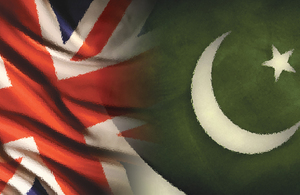UK’s support to global vaccine facility Covax will help Pakistan’s COVID-19 vaccination programme
The UK’s world-leading support to the global COVID-19 vaccines facility Covax will help millions of Pakistanis protect themselves against Coronavirus.

UK’s support to global vaccine facility Covax will help Pakistan’s COVID-19 vaccination programme
So far, the UK has committed £548m to the global Covax initiative, making the UK the largest single donor. The Covax initiative is the key way that more than 180 countries will have fair, early access to COVID-19 vaccines. The UK has also encouraged other countries to contribute over $1bn to Covax. Through the Covax facility, Pakistan will take delivery of 17m doses of the UK-developed Oxford University-Astra-Zeneca vaccine shortly, with the first 7m expected before April. The next 10m doses will come later, likely before June. This will help protect 8.5m people from the virus, which has already claimed over 12,000 lives in Pakistan.
Overall, Covax - which stands for Covid-19 Vaccines Global Access Facility - has committed to supply Pakistan with vaccines for 45m people this year alone. Covax is an international initiative to support the discovery, manufacture and fair distribution of COVID-19 vaccines for one billion people by the end of 2021.
British High Commissioner Dr Christian Turner CMG said:
The people of the UK and Pakistan have come together to fight COVID-19.
The Covax facility has been the main way the world has united to make sure all countries get the vaccines they need as quickly as possible, including Pakistan. The UK has been a world leader in supporting Covax, and Covax has committed to supplying Pakistan with COVID-19 vaccines for 45m people this year.
The UK has stood shoulder-to-shoulder with Pakistan in pandemic, pivoting around £20m of UK aid to help Pakistan fight the pandemic. This includes funding the World Health Organization (WHO) since April 2020 to build laboratory testing capacity through training and provision of equipment across Pakistan.
The UK has so far pledged up to £1.3 billion of UK aid overall to end the coronavirus pandemic as quickly as possible. This includes up to £829 million for the development and distribution of new vaccines, treatments and tests, and £5 million for other critical COVID-19 research and development.
The UK is also at the forefront of efforts to drive unprecedented global collaboration and resourcing for the development and delivery of new vaccines, treatments and tests at the speed and scale required. The UK-hosted Global Vaccines Summit on 4 June 2020 raised US$8.8 billion from 32 donor governments and 12 foundations, corporations and organisations to replenish Global Vaccine Alliance (GAVI) funding over the coming five years. This will help support the delivery of life-saving vaccinations in 68 countries and will be integral to the distribution of a coronavirus vaccine once it is developed.
Notes to editors:
-
Covax works towards the development, purchase and delivery of vaccines to more than 180 countries. It was launched in April 2020 and is led by the World Health Organization (WHO), together with the Global Vaccine Alliance and the Coalition for Epidemic Preparedness Innovations.
-
The UK announced at the United Nations General Assembly in September that it would match every $4 pledged to Covax by other donors with £1 in UK funding, up to £250 million. Since then, other countries including Canada, Japan and Germany have committed funding to the scheme.
-
On 4 January, the UK NHS became the first health service in the world to deploy the life-saving Oxford University-AstraZeneca after meeting strict standards of safety, quality and effectiveness. It is the only approved vaccine which can be stored at fridge temperatures.
-
Scientists advising the World Health Organization (WHO) have recommended the use of the Oxford-AstraZeneca Covid-19 vaccine in all adults – including those aged over 65. The WHO’s strategic advisory group of experts on immunisation has issued interim recommendations on the vaccine, saying the jab could be given to people aged 18 and above “without an upper age limit”.
-
Current evidence does not suggest any lack of protection against COVID-19 in people aged 65 or over who receive COVID-19 Oxford University-AstraZeneca. This decision is in line with that made by the European Medicines Agency today, which have authorised COVID-19 Vaccine AstraZeneca in people from 18 years of age – including those aged 65 and above.
For further information
For updates on the British High Commission, please follow our social media channels:
- Twitter: @UKinPakistan, @CTurnerFCDO
- Website
Contact
British High Commission
Islamabad
tel. 0300 500 5306